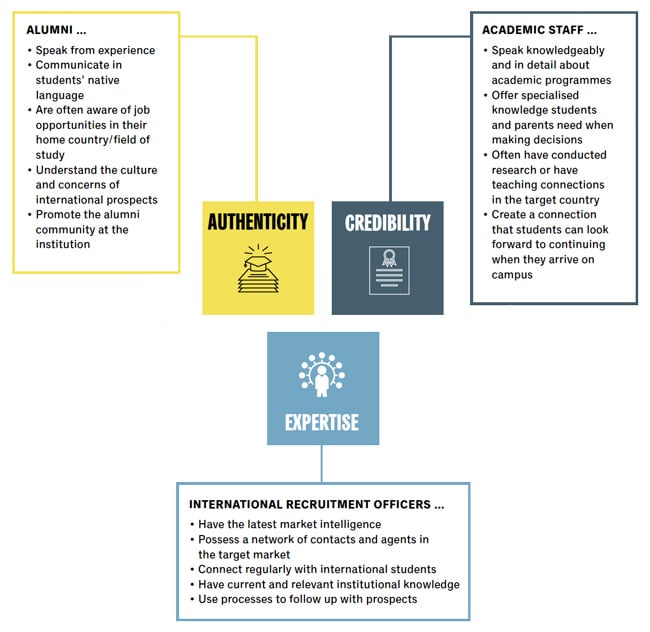Five steps to a more active alumni programme
There’s a paradox at work regarding the extent to which many colleges and universities are engaging with their international alumni. A 2017 survey undertaken by international education consultancies Academic Assembly and Intead found that the majority of college administrators felt that their institutions are not doing enough to connect with international alumni. Nearly two-thirds reported having no dedicated staff time for global alumni relations. Yet survey respondents were highly aware of the role alumni can play in recruiting students: more than half considered global alumni management to be “very important” to their recruitment and branding efforts. In that, they’re quite right: alumni can add a powerful personal element to a marketing programme. Former students have first-hand knowledge of what it’s like to study at a college or university, and that’s exactly what prospective students are looking for in making study abroad decisions. “Students who’ve completed their studies aren’t just graduates,” says Gretchen Dobson, one of the primary authors of the report and the president of global alumni relations with Academic Assembly. “They have the potential to have a lifelong relationship with the institution.”
Alumni as brand ambassadors
Investing in international alumni relations allows educators to leverage the support of former students. “Alumni based overseas can be engaged, for example, to deliver independent talks in schools and colleges, extending the institution’s reach into areas where recruitment officers may not operate,” says Nicholas Miller in a report for the UK’s Higher Education Academy. “International alumni can also serve as ambassadors, engaging with prospective international students and their parents to help boost recruitment efforts and grow connections overseas.”
The following graphic highlights how alumni add a critical element of authenticity to an institution’s recruitment effort.

Five steps
1. Seek buy-in from senior leadership: Ms Dobson, who led international alumni efforts at Tufts University for a decade and now consults and writes widely on the subject, notes that the more support there is for an alumni strategy, the more successful it will be. 2. Get organised: The Academic Assembly/Intead report recommends establishing a budget, and ideally, “establishing a cross-functional team from admissions, advancement, international programmes, and career services for grassroots alumni engagement.” 3. Don’t lose track of your graduates: Ms Dobson advises educators to put some good, basic data systems in place to log information about international graduates. Her report suggests classifying international graduates as “transnational alumni” who may go on to further work or study in the US or a third country, and/or return to their home country over time – all possibilities that hold potential for them to be brand ambassadors. Every year, alumni should be invited to update their contact information. 4. Connect with the students you have now: Anne Hayner, the associate director for alumni relations with the University of Notre Dame’s Kroc Institute for International Peace Studies, points out that alumni relations begin with current students. “Start with the students you have now,” she says. “Connect with them and make sure they feel connected to you.” International networking and engagement with foreign graduates are both central to the institute’s programmes, and Kroc has a long-established and active network of global alumni as a result. 5. Start small and build from there: Commit to making international alumni part of what your institution does, and understand that first steps lead to more steps. Ms Hayner points out that any institution can begin to strengthen its efforts in this area, even with modest budget or staff resources.
Engaging with your network
Engaging with alumni means not just asking them for help, but also being responsive to what they need, notes Ms Hayner. “Ask people what they need or want,” she suggests. “For example, part of my job is to help the students professionally network. So we keep them advised of what people are doing in the field through professional or alumni profiles, and we help them to stay connected to faculty or research resources so that they can stay on top of contemporary scholarship in the field.”
Recognise effort
Writing in NAFSA’s Guide to International Student Recruitment, Aaron Zdawczyk points out that “Most alumni programmes are volunteer-based, so the opportunity for the graduate to represent his or her alma mater in the community and to engage with local students and families is often reward enough. However, developing a public system of recognition to highlight exceptional efforts and commitment is [a valuable step in keeping] alumni excited and energised.” Some institutions are going so far as to reward alumni monetarily for direct referrals. Vancouver Island University, for example, offers a $300 “thank you” to current students and alumni if they refer an international student and that student is accepted and attends a full semester of ESL, undergraduate or graduate studies at VIU. This real-life example is a powerful testament to the immediate impact on enrolments that an alumni’s vouching for an institution can have. For additional background, please see:
















